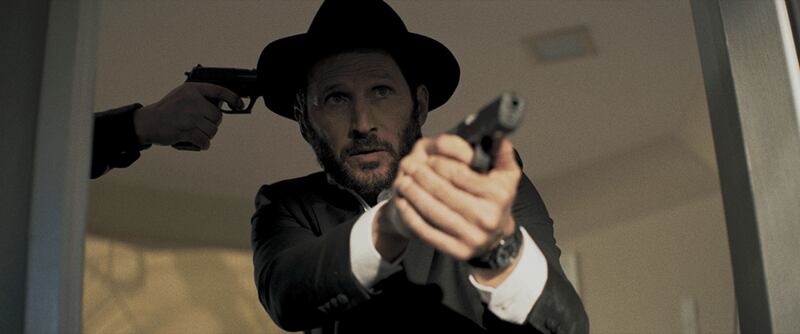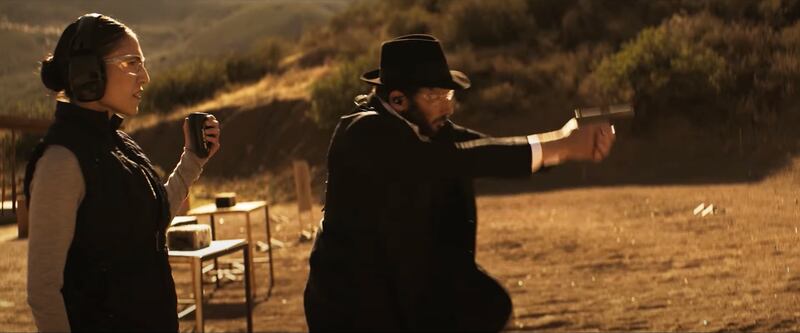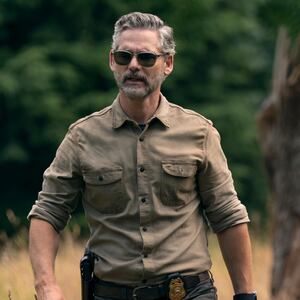In the years following the success of Quentin Tarantino’s Pulp Fiction, plenty of indie filmmakers dusted off (or hastily created) stylized gangster-movie screenplays, resulting in a glut of movies that, fairly or not, came across as Tarantino karaoke.
At first, the new crime film Guns & Moses, in theaters July 18, appears to take the novel approach of crossing a bad ’90s Tarantino knockoff with a far rarer late ’00s Tarantino knockoff. Specifically, putting a glock in the hands of Rabbi Mo Zaltzman (’90s sitcom fixture Mark Feuerstein) feels like an attempt to update Inglourious Basterds catharsis to the present day—perhaps a misguided mission, given the headlines that have repackaged unimaginable levels of violence as self-defense.
Most of Guns & Moses isn’t nearly so misguided as its (limited) advertising campaign implies, though that also means it’s not especially memorable beyond the sight of a one-time Caroline in the City boyfriend eventually packing heat.

As the movie opens, Rabbi Zaltzman, along with close ally Mayor Donovan Kirk (Neal McDonough), is speaking at a celebration honoring Alan Rosner (Dermot Mulroney) for his contributions to a Jewish community in California’s high desert. Bedlam ensues when an assassin’s bullet strikes Rosner down. Suspicions immediately turn to aggressive local boy Clay Gibbons (Jackson Dunn), who is affiliated with a neo-Nazi group and has harassed Zaltzman’s congregation. He’s quickly arrested, despite his protests and the protests of his father Owen (Jake Busey).

Yet Zaltzman himself isn’t convinced that the boy is guilty, for an admittedly far-fetched reason: He once urged Clay to listen as Sol Fassbinder (Christopher Lloyd) explained his firsthand experience of the Holocaust, which Clay was attempting to deny. Clay then accepted a homemade brownie from Zaltzman; the rabbi is convinced that this encounter got through to the boy on some level. (He has great faith in the awesome powers of guilt.)

It turns out this isn’t a revenge thriller about a rabbi arming himself to fend off neo-Nazis, but an amateur-detective noir with Rabbi Zaltzman conducting his own investigation—further complicated by a second murder and accompanying suspect.
Director and co-writer Salvator Litvak has a great noir hook: a Jewish leader inexperienced with crime-solving but deeply familiar with the local players, convinced that these shootings are not actually the product of antisemitism. (It helps keep Zaltzman as a lone voice when otherwise he would have the support of his community.) If only Litvak had come up with less obvious alternate solutions; anyone who has seen a noir or even noir-influenced movie will be able to pinpoint the likely bad guy before any crime is actually committed. Honestly, attentive readers of this review have probably already figured it out, too.

Mysteries with obvious solutions can still have plenty to offer by way of character and atmosphere; Guns & Moses sometimes looks like a regionally specific detective story, especially in a visually striking scene where Zaltzman is attacked by an anonymous assailant in the midst of a massive solar-panel field. But while it’s set in California’s high desert region, the movie often seems to mistake that area for a nonexistent small town called High Desert, which doesn’t do much for its sense of place.

And despite the noirish set-up, Litvak does eventually revert to dimly-lit shoot-outs where the rabbi must put to use the firearm training from security expert Brenda Navarro (Gabrielle Ruiz, from Crazy Ex-Girlfriend). The movie is weirdly fixated on the idea that Zaltzman must, must arm himself, even without believing that Nazis are behind the murders.
Maybe that’s why the mystery is so wan. The gun-training montages dovetail with the movie’s final—only, really—twist, which arrives well after the end credits begin to roll.

After a few minutes, Litvak appears in an on-screen message like those that adorn recent faith-based movies, giving audiences the opportunity to pyramid-scheme up some more ticket sales via a QR code. (McDonough has starred in several of these, making him the unlikely cross-faith king of movies that pass the collection plate at the end.)
Litvak then invokes the terror attack of October 7, and reports that, like the rabbi character, he has gotten over a reluctance to arm himself, to better ensure that Jews will not be a “soft target.” Say what you will about the post-credit scenes in superhero movies; they rarely ask you to buy more tickets while making sure you understand that the director is armed. It all makes any resemblance between Guns & Moses and a regular-bad noir seem purely coincidental.








